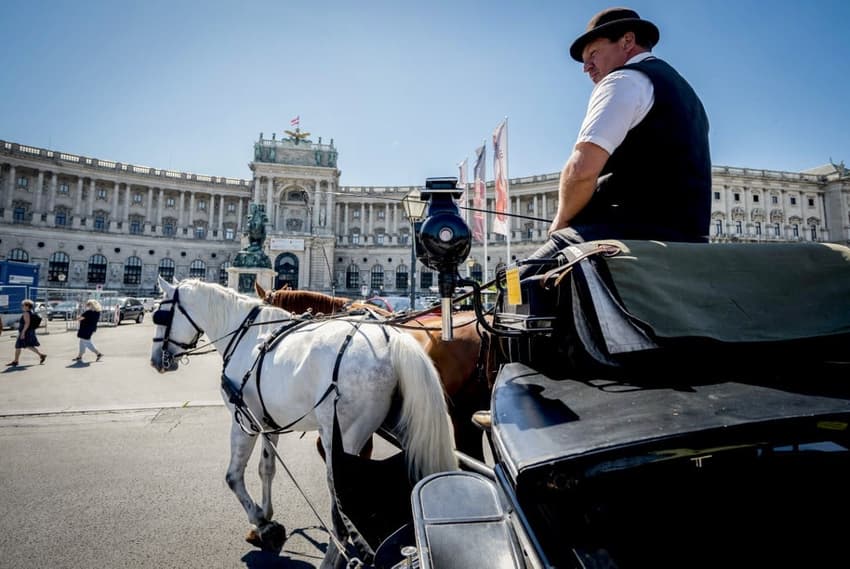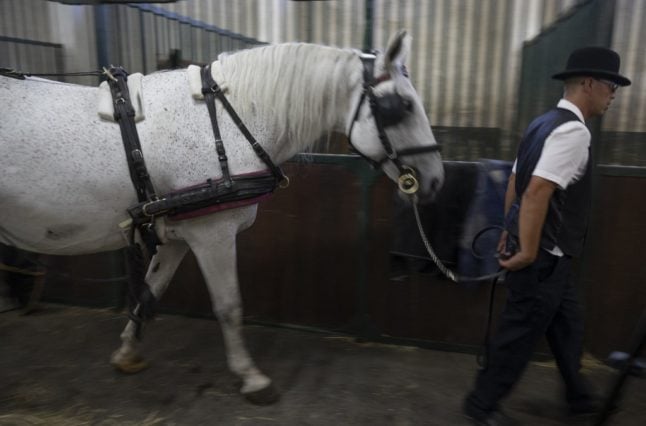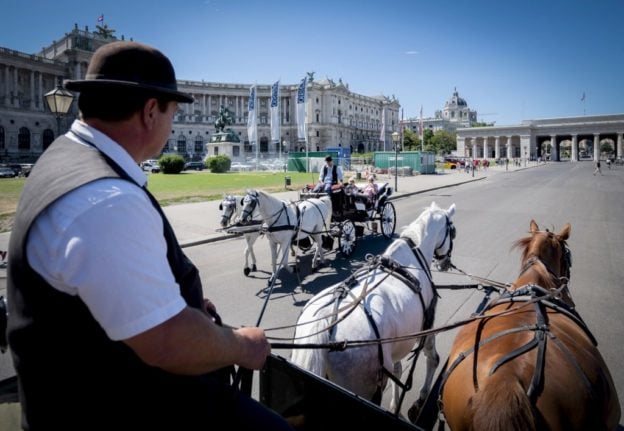In Austria, Vienna's horse-drawn carriages feel the heat

As much of Europe stifles under record high temperatures, Vienna's "fiaker" horse carriage drivers fear for their future with animal rights activists turning up the heat.
At the stables of one of the Austrian capital's leading fiaker businesses, driver Marco Pollandt explains how the animals are coping with increasingly hot weather and how much time off they enjoy.
Rights activists want horses to stop work as soon as temperatures hit 30C (86F) and not 35C as under current rules -- a demand that fiaker or carriage drivers say will destroy their centuries-old profession.
"We can all live with the 35C but going down more is actually not good for the horses, and we also have to discuss the economic results of this," Pollandt tells AFP.
The 28-year-old Viennese says horses trained to pull carriages need the exercise, while their caretakers need the income.
READ ALSO: EXPLAINED: Will Austria ban horse-drawn carriages?
On hot days, fiaker drivers ensure the horses drink enough, while the places where they wait for customers are shady in the afternoon.
"The climate is changing and it's getting more and more hot," Pollandt says.
"And of course it makes a difference if we have seven days a year that we are not allowed to ride or if we have 30 days a year we are not allowed to ride."
High demand
Pollandt -- who used to work in gastronomy and started to offer dining in a fiaker five years ago -- has been running a website to inform people about the horses and the carriage driving profession. He also runs stable tours offering a glimpse behind the scenes.

A coachman of horse driven carriages (Fiakers) prepares his horse at the stables of a leading fiaker business prior leaving stables for daily tourist tours in Vienna, Austria, on July 13, 2022.(Photo by JOE KLAMAR / AFP)
Three hundred horses still pull carriages through Vienna, past the town hall and other tourist sites, generating thousands of jobs, he notes.
"I realised no one actually explains to people how everything works," says Pollandt pointing to strict regulations and regular veterinary checkups to keep the horses fit.
READ ALSO: One day in Vienna: How to spend 24 hours in the Austrian capital
Hurt by Covid lockdowns and travel curbs since 2020, business has picked up again swiftly this year.
But activists say the animals suffer in the big city especially in scorching temperatures.
"This work is clearly linked to animal suffering. The horses are sometimes in the sun at 34.5C and working."

Buckets of water, rest in the shade and caring coachmen but no summer break for the famous cabs of Vienna, despite the heat wave and the pressure of animal defenders. (Photo by JOE KLAMAR / AFP)
"They are exposed to noise, exhaust fumes, traffic and of course stress," says David Fenzl of the Association against Animal Factories.
In June, city officials considered the demands to enforce stricter regulations, but in the end decided to delay lowering the temperatures under which horses are not allowed to work, pending a study to be carried out next year.
READ ALSO: Austria bans ‘senseless’ killing of chicks with new animal welfare rules
So for now, fiakers can ride on -- unless temperatures exceed 35C, as predicted later this week.
Scientists say heat waves are becoming more frequent and intense due to climate change.
Britain and France went on unprecedented heatwave alerts this week as southwest Europe wilted and ferocious wildfires devoured more forests.
Comments
See Also
At the stables of one of the Austrian capital's leading fiaker businesses, driver Marco Pollandt explains how the animals are coping with increasingly hot weather and how much time off they enjoy.
Rights activists want horses to stop work as soon as temperatures hit 30C (86F) and not 35C as under current rules -- a demand that fiaker or carriage drivers say will destroy their centuries-old profession.
"We can all live with the 35C but going down more is actually not good for the horses, and we also have to discuss the economic results of this," Pollandt tells AFP.
The 28-year-old Viennese says horses trained to pull carriages need the exercise, while their caretakers need the income.
READ ALSO: EXPLAINED: Will Austria ban horse-drawn carriages?
On hot days, fiaker drivers ensure the horses drink enough, while the places where they wait for customers are shady in the afternoon.
"The climate is changing and it's getting more and more hot," Pollandt says.
"And of course it makes a difference if we have seven days a year that we are not allowed to ride or if we have 30 days a year we are not allowed to ride."
High demand
Pollandt -- who used to work in gastronomy and started to offer dining in a fiaker five years ago -- has been running a website to inform people about the horses and the carriage driving profession. He also runs stable tours offering a glimpse behind the scenes.

Three hundred horses still pull carriages through Vienna, past the town hall and other tourist sites, generating thousands of jobs, he notes.
"I realised no one actually explains to people how everything works," says Pollandt pointing to strict regulations and regular veterinary checkups to keep the horses fit.
READ ALSO: One day in Vienna: How to spend 24 hours in the Austrian capital
Hurt by Covid lockdowns and travel curbs since 2020, business has picked up again swiftly this year.
But activists say the animals suffer in the big city especially in scorching temperatures.
"This work is clearly linked to animal suffering. The horses are sometimes in the sun at 34.5C and working."

"They are exposed to noise, exhaust fumes, traffic and of course stress," says David Fenzl of the Association against Animal Factories.
In June, city officials considered the demands to enforce stricter regulations, but in the end decided to delay lowering the temperatures under which horses are not allowed to work, pending a study to be carried out next year.
READ ALSO: Austria bans ‘senseless’ killing of chicks with new animal welfare rules
So for now, fiakers can ride on -- unless temperatures exceed 35C, as predicted later this week.
Scientists say heat waves are becoming more frequent and intense due to climate change.
Britain and France went on unprecedented heatwave alerts this week as southwest Europe wilted and ferocious wildfires devoured more forests.
Join the conversation in our comments section below. Share your own views and experience and if you have a question or suggestion for our journalists then email us at [email protected].
Please keep comments civil, constructive and on topic – and make sure to read our terms of use before getting involved.
Please log in here to leave a comment.